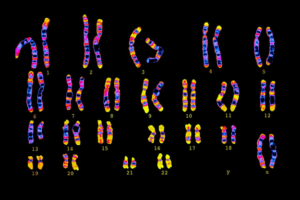- Scientists behind game-changing cancer immunotherapies win Nobel medicine prize (reuters.com)2018 Nobel Prize in Medicine Awarded to 2 Cancer Immunotherapy Researchers (nytimes.com)
American James Allison and Japanese Tasuku Honjo won the 2018 Nobel Prize for Physiology or Medicine on Monday for game-changing discoveries about how to harness and manipulate the immune system to fight cancer...The seminal discoveries by the two Laureates constitute a landmark in our fight against cancer...Allison...worked on a protein known as CTLA-4 and realized that if this could be blocked, a brake would be released, unleashing immune cells to attack tumors...Honjo...separately discovered a second protein called PD-1 and found that it too acted as an immune system brake, but with a different mechanism...The discoveries led to the creation of a multibillion-dollar market for new cancer medicines. In particular, drugs targeting PD-1 blockade have proved a big commercial hit, offering new options for patients with melanoma, lung and bladder cancers...
- How IBM and the CDC are testing blockchain to track health issues like the opioid crisis (fastcompany.com)HIT Think How blockchain could solve 4 major problems in healthcare (healthdatamanagement.com)
IBM and CDC experts are hopeful that using a blockchain could help streamline long-running surveys that track patient symptoms and treatments...The Centers for Disease Control and IBM are collaborating on a blockchain-based system that could track public health issues like the ongoing opioid crisis...The new system, which IBM and the CDC’s National Center for Health Statistics have tested using simulated data, could make it easier for the CDC to survey medical providers about data like the reasons patients visit and the symptoms they display...Using the blockchain approach could make it easier to automatically collect the data, keep it secure, and log who’s accessed which parts of it...“There’s a lot of transparency that blockchain seems to offer to us,”...Blockchains are perhaps still most commonly associated with cryptocurrencies, where the secure digital ledgers are used to track who owns each unit of currency, with copies of the ever-growing chain of records automatically duplicated to anyone who wants them. But companies like IBM and Microsoft are exploring how the technology can be used in more traditional industries to sync up data like logs and transaction records between business associates, like health providers and the CDC. The automatic data replication can help maintain a reliable audit trail for more than just digital currency, they say...
- FDA Approves First-of-its-Kind RNA Therapy (biopharminternational.com)
The new drug, Onpattro (patisiran), by Alnylam Pharmaceuticals, is in a new class of drugs called small interfering ribonucleic acid (siRNA) treatment...a first-of-its-kind RNA-based therapy for treating peripheral nerve disease (polyneuropathy) caused by hereditary transthyretin-mediated amyloidosis (hATTR) in adult patients...Polyneuropathy caused by hATTR is a rare, debilitating, and often fatal genetic disease characterized by the buildup of abnormal amyloid protein in peripheral nerves, the heart, and other organs...“This approval is part of a broader wave of advances that allows us to treat disease by actually targeting the root cause, enabling us to arrest or reverse a condition, rather than only being able to slow its progression or treat its symptoms...“New technologies like RNA inhibitors that alter the genetic drivers of a disease, have the potential to transform medicine, so we can better confront and even cure debilitating illnesses.
- As Amazon Lurks, Walgreens Launches Digital Marketplace Listing Providers And Prices (forbes.com)
Walgreens Boots Alliance is launching a new digital marketplace that will connect the pharmacy chain's mobile visitors to its drugstores as well as local doctors and clinics...The move comes as Walgreens, CVS Health, Walmart and other brick-and-mortar retailers with health services face the possibility online retailer Amazon will expand deeper into the healthcare business...But Walgreens is stressing ties to local healthcare providers, which Amazon doesn’t yet have...Walgreens “Find Care Now” platform lists cash prices for healthcare services for everything from a local clinic or optometrist to the cost of a telehealth vendor’s virtual doctor consultation. For now, there are 16 local health systems and national healthcare providers participating in Find Care Now but Walgreens said they expect more to join the marketplace.
- Pharma’s slow embrace of continuous manufacturing (biopharmadive.com)
Widespread in other industries, continuous manufacturing features what's essentially an end-to-end assembly line, through which raw materials are steadily fed and constructed into final products...It's seen as faster and more flexible than the tried-and-true system of batching that forms the foundation of pharma manufacturing. The Food and Drug Administration is eagerly encouraging its use ...on a whole, the industry remains wedded to batch production. The reasons for why are many, but foremost is a reluctance to overhaul finely tuned manufacturing networks or to introduce new risks into drug development...Doing something different like continuous was going outside the box...Using an uninterrupted production process eliminates, or significantly reduces, the "hold times" in between steps that are typical in batch manufacturing. For J&J, production of Prezista used to take about two weeks from start to finish using batch methods...through continuous manufacturing, production takes only three days...since the raw ingredients don't need to transition in and out of production for quality testing, continuous manufacturing systems can run over a longer period of time, potentially upping output...For all of the advantages of continuous manufacturing over batch production, drugmakers must weigh switching over against retooling carefully crafted production networks.
- Gottlieb Spells out Vision for FDA Modernization Efforts to Create a new Data Enterprise (raps.org)
As the US Food and Drug Administration continues to navigate a bumpy road toward modernization, a new data enterprise will aim to enhance regulatory decisions on products...The growing number of novel medical products in the US prompted FDA to “refashion” the approaches to drug and device regulations and “create more modern platforms that are better suited to the efficient evaluation of these advances,” said FDA Commissioner Scott Gottlieb...The initiatives already underway...will help “fund the creation of a cross-cutting data enterprise for the generation of evidence, and a more modern and integrated approach to the evaluation of this information,”...Modernization is intended to make regulatory premarket reviews more consistent and predictable to ultimately increase competition among firms and allow for more timely patient access to a greater number of drugs and devices in the US market that are more affordable and of higher quality. This culture shift could also lead to reduced burden and potential cost savings...
- Cashing in on DNA: race on to unlock value in genetic data (reuters.com)
How much is your DNA worth? As millions of people pay for home tests to check on ancestry or health risks, genetic data is becoming an increasingly valuable resource for drugmakers, triggering a race to create a DNA marketplace...GlaxoSmithKline’s decision to invest $300 million in 23andMe and forge an exclusive drug development deal...crystallizes the value locked up in genetic code...Firms like EncrypGen, Nebula Genomics, LunaDNA and Zenome are using blockchain...to secure sensitive DNA records and create a transaction ledger. The new players all have slightly different models, with most simply provide data platforms, where people are rewarded for providing data...For drugmakers...access to this data offers a way to accelerate drug development, since finding a drug target linked to a human genetic variant doubles the chance of producing a new medicine.
- The search for new drugs is coming to your house (fastcompany.com)
Virtual trials could address some of the problems that come with developing new drugs, but a host of challenges remain before they can become routine...Last October, AOBiome Therapeutics...announced the results of a 12-week clinical trial of an experimental acne drug. In the randomized double-blind and placebo-controlled trial, a topical spray containing a beneficial bacteria was shown to be safe and effective in reducing the severity and number of acne lesions, the company said...The drug must successfully go through another round of testing–what’s called a Phase III trial–before AOBiome can apply to the Food and Drug Administration for marketing approval...Volunteers for the completed trial were recruited through social media and internet advertisements, and more than 8,000 people were screened online to see if they were eligible. The resulting 372 participants received the drug or a placebo in the mail and used company-issued iPhones to take selfies of their acne, a phone app to send the photos to physician-investigators for evaluation, and video conferencing to communicate with study staff...That’s markedly different from a typical drug trial...AOBiome’s acne drug trial, there were no in-person screening interviews, and no doctor visits. The trial was entirely what people in the trade call “virtual.”...Whether virtual clinical trials are the way forward is a matter of some debate, and industry analysts say a host of challenges remain before virtual trials–which currently represent a tiny fraction of the more than 100,000 registered clinical research studies in the United States–become the norm. These include overcoming a conservative corporate culture, ensuring that the technology is easy for patients to use, managing and analyzing the enormous amount of data that round-the-clock sensors generate, and proving the data’s reliability and validity to regulators...
- Predicting the Risk for Five Deadly Diseases (ptcommunity.com)
Scientists have created a powerful new tool to calculate a person’s inherited risks for heart disease, breast cancer, type 2 diabetes, chronic inflammatory bowel disease, and atrial fibrillation...By surveying changes in DNA at 6.6 million places in the human genome, investigators at the Broad Institute and Harvard University were able to identify many more people at risk than do the usual genetic tests, which take into account very few genes...The researchers are now building a website that will allow anyone to upload genetic data from a company like 23andMe or Ancestry.com. Users will receive risk scores for the five aforementioned diseases. A risk score, including obtaining the genetic data, should cost less than $100...The study began because there was general agreement among researchers that many common diseases are linked not to one mutation, but rather to thousands or millions of mutations...scientists have cataloged more than 6 million tiny changes in DNA that slightly affect the chances that people will get various diseases. Each of those genetic alterations has such a small effect—approximately a 1 percent increase or decrease in a person’s odds of getting a disease — that it would not be helpful to test for each one in isolation...But...to combine data on all of the small DNA changes to construct an individual risk score. To do that, the researchers needed a new algorithm that would weigh the significance of the variations in the genes.
- Mount Sinai’s medical school opens blockchain research center (medcitynews.com)
...blockchain technology has moved from cryptocurrency to other fields…The Icahn School of Medicine at Mount Sinai and the Institute for Next Generation Healthcare opened the Center for Biomedical Blockchain Research...with the aim of developing partnerships with companies looking to apply the technology to clinical medicine and biomedical research…Researchers have also been seeking to apply the technology to clinical trials...the British Medical Journal concluded that blockchain provides a significant opportunity for clinical research because it can help structure more transparent, checkable methodology and, under certain conditions, check clinical trial integrity...Imperial College London played host to a hackathon specifically to explore the use of blockchain in clinical trials...to replace the operations of contract research organizations...The two finalists proposed using distributed ledger technologies to operate all the necessary transactions between drug companies running trials and the clinical trial sites where they take place...










